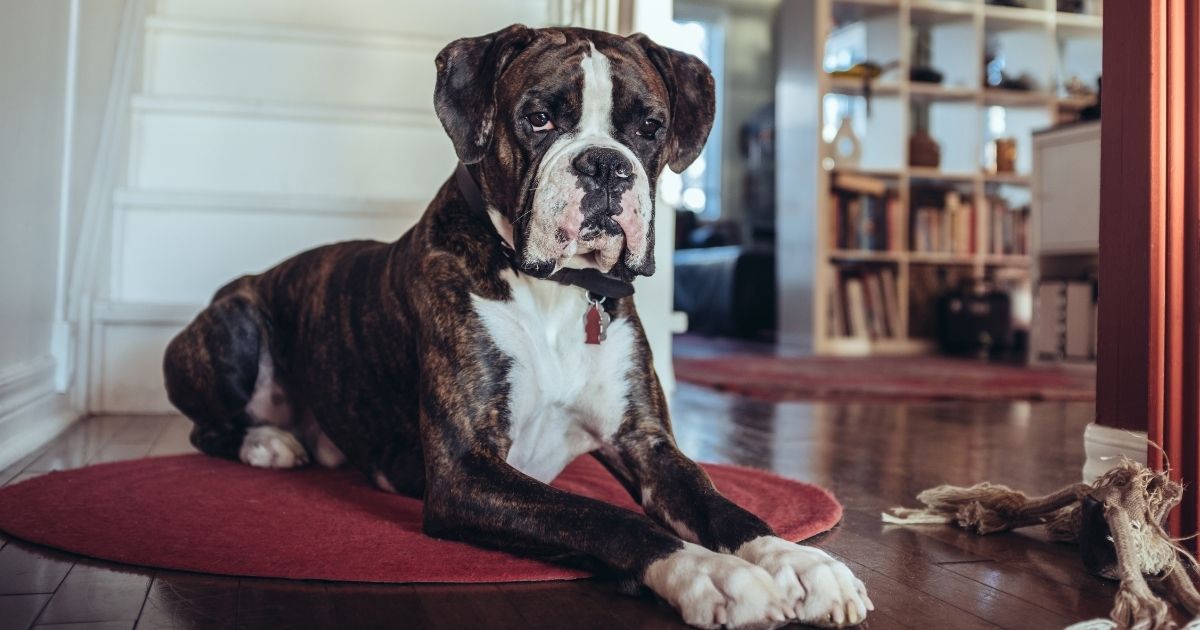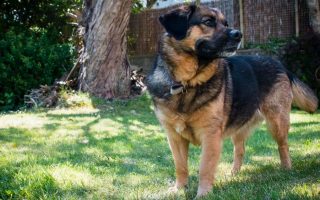When you hear the word Boxer, what comes to your mind?
Probably the image of a large, muscular, and ferocious dog that won’t hesitate to get into a figurative fighting ring with another dog or human.
While the Boxer dog breed is indeed large and muscular, you might want to hold onto the ferocious part till you finish reading this article.
The Boxer originated in Germany in the late 19th century and was developed to hunt and work.
These days, however, people buy or adopt this breed to train it as a companion.
What are the chances of that succeeding? Are Boxers good family dogs?
If you’ve got doubts over this breed, you’ve come to the right place.
Through a detailed analysis of its temperament, we will be able to decide whether or not the Boxer is a good family dog.
You’ll also get other important information on this breed.
Boxer Dog Breed Information
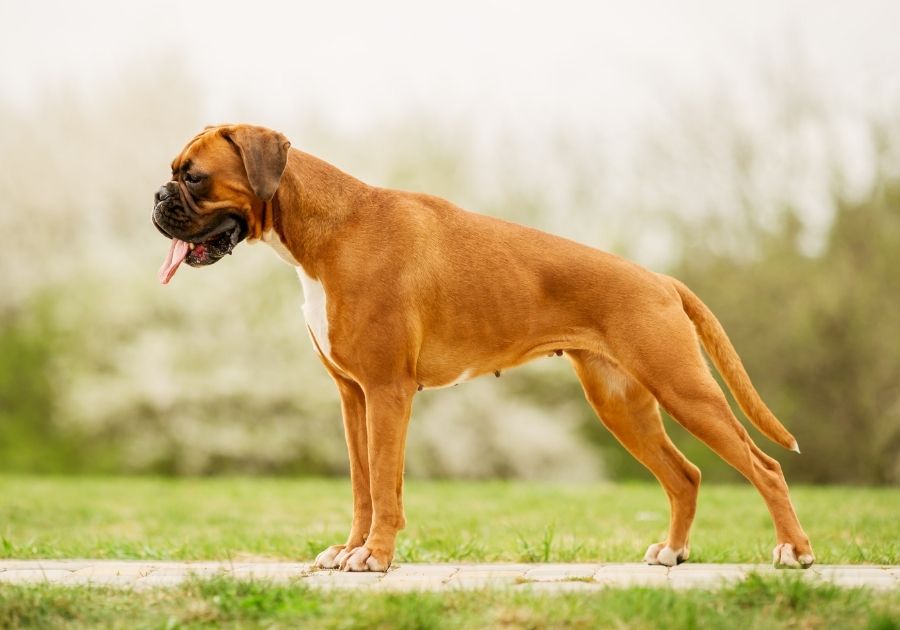
| Height | 21 to 25 inches |
| Weight | 60 to 70 pounds |
| Life Expectancy | 10 to 12 years |
| Coat | Short, smooth |
| Colors | Fawn, brindle with a white mark |
| Temperament | Bright, energetic, devoted |
| Ideal For | Active pet parents |
| Hypoallergenic | No |
| Breed Recognition | American Kennel Club, United Kennel Club, The Kennel Club |
| Puppy Price | $800 to $2,800 |
Boxer Characteristics
| Health | High |
| Grooming | Low |
| Friendliness | High |
| Energy | High |
| Trainability | Medium |
The Typical Boxer Temperament
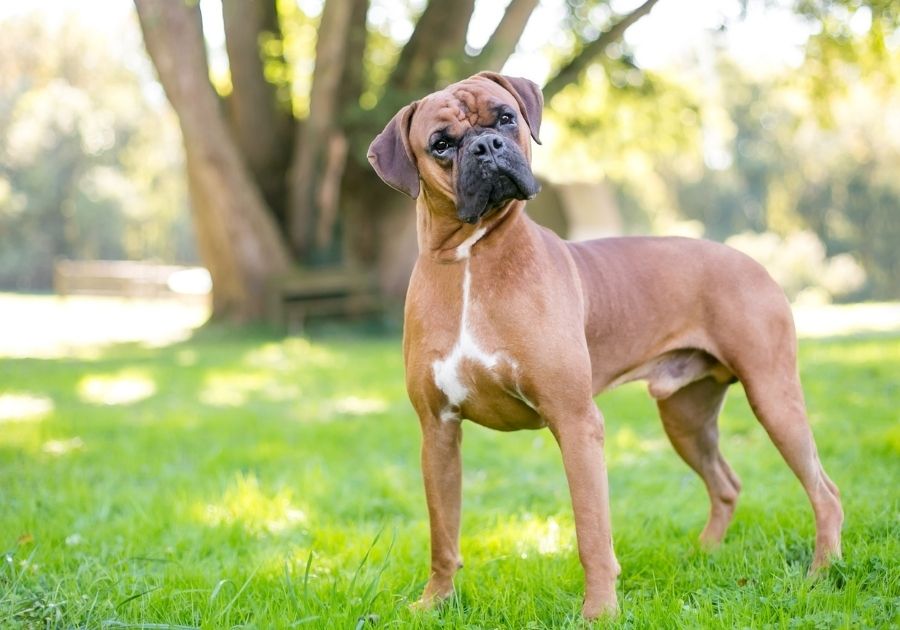
Boxers are known to be energetic, which shouldn’t be surprising when you consider their hunting and working past.
They can also be stubborn during training, especially when you try to force them to do something.
Those are the only behavioral challenges you might face with the Boxer dog breed.
Of course, we’re working with the assumption that you’re both willing and capable of training a Boxer.
Any badly trained dog will give more challenges than high energy and occasional stubbornness.
The well-trained Boxer is a devoted, loyal, and alert pooch. It makes a good guard dog and would do whatever it takes to defend its family.
Strangers and the unknown visitor may meet a dignified and reserved dog, and the very friendly ones will get a polite greeting in return.
This depends largely on the individual Boxer, though. Some are known to be sociable. Either way, only the family receives its full love.
This breed has a clownish side and can be quite mischievous. Be sure to get loads of humor when you get a Boxer.
It doesn’t mature too fast, making it retain its puppylike nature for long. For this reason, it is usually called the “Peter Pan of dog breeds.”
Overall, the Boxer is an intelligent breed with a lovely personality.
Are Boxers Good Family Dogs?
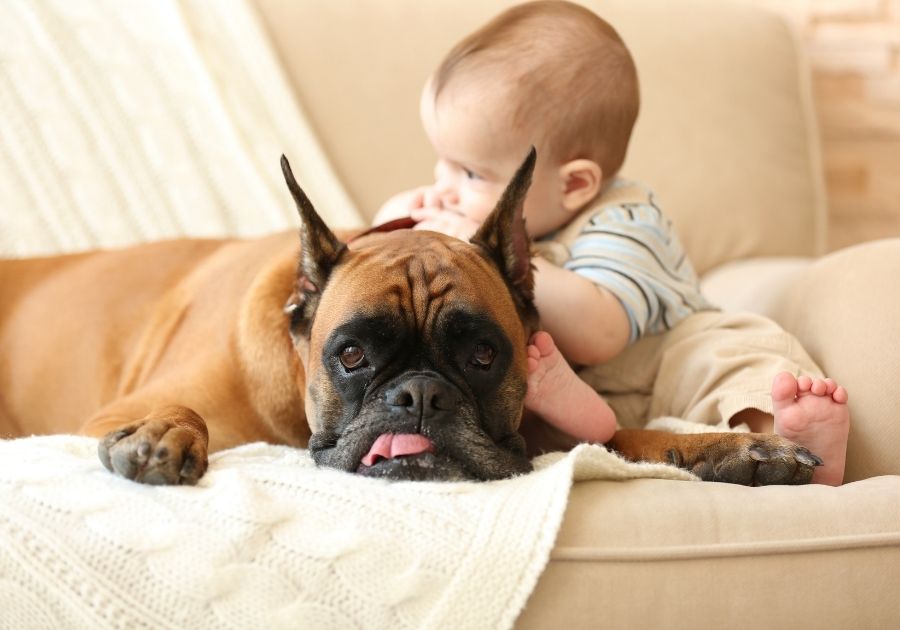
“The Boxer’s most notable characteristic is his desire for human affection.”
AKC
The above quote sums it up quite well. Boxer dogs worked and hunted alongside humans and are used to being around them.
Consequently, these dogs enjoy human company and fit well in household situations. They are as playful as they are devoted, and they love their families.
So, yes, the Boxer is a good family dog. Its many lovely qualities endear it to pet parents over and over. It is also patient and friendly with kids, though its energy may be too much for toddlers.
As further proof that the Boxer is an ideal family dog, it tends to appear in any list of good dogs for first-time pet parents.
It is also top 20 on the AKC’s recent list of popular dog breeds, a feat that wouldn’t be possible if it wasn’t suitable for family living.
For every prospective Boxer pet parent, do not fret. Your dreams of having an ideal household dog can be realized, as long as you meet its needs for exercise, feeding, gentle training, and more.
Are Boxers Good with Other Dogs and Pets?
When you raise Boxers alongside dogs and other pets, they tend to get along with them.
Boxers are not known to be aggressive towards other canines, so you can have a peaceful multiple dog home.
With other pets like cats and rodents, you should introduce them to your Boxer when it is still a pup.
It has a high prey drive and should learn to differentiate pets from prey. Socialization is very necessary here.
Are Boxers Friendly?
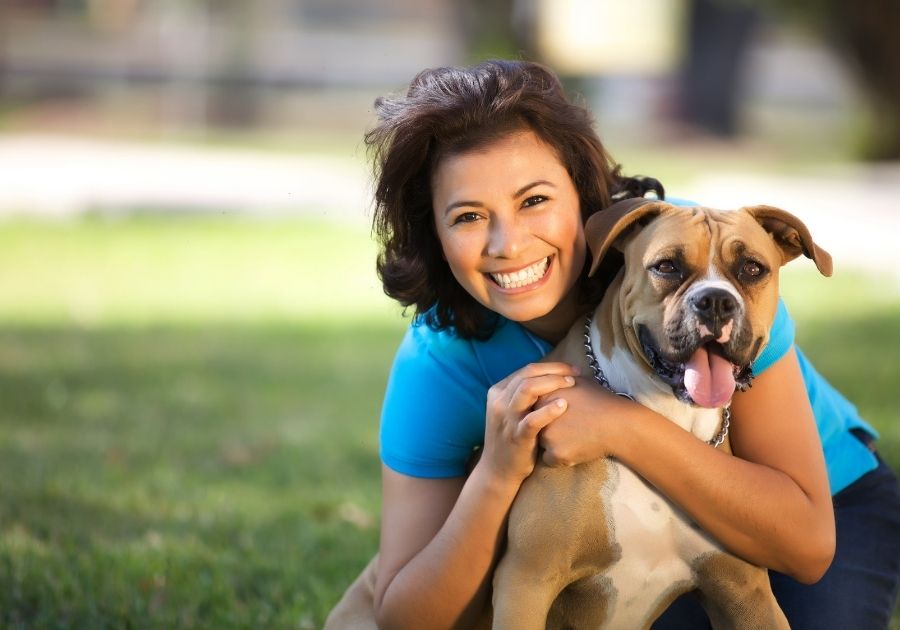
All things being equal, the only time you’ll find a Boxer getting aggressive is when their family is threatened by someone.
The Boxer is protective of those it loves and defensive too. This makes it a good guard dog.
This breed is also naturally wary of strangers, perhaps due to its hunting history of viewing the unknown as dangerous.
It won’t attack unless provoked, though, and will even warm up if the stranger is caring.
This isn’t universal to all members of this breed, though, as some are welcoming of strangers.
All that being said, the Boxer is friendly and affectionate towards its family members, both adults, and children.
It loves to play, goof around and show its loyalty to its loved ones.
Recommended:
20 Most Dangerous Dog Breeds You Mustn’t Mess With
Are Boxers Easy to Train?
Boxer dogs are trainable and can even be handled by a novice, but that doesn’t mean it is too easy to train.
It falls in the middle of the spectrum between easy-to-train dogs (like the Labrador Retriever and Golden Retriever) and harder ones (like the Siberian Husky).
Remember that the Boxer is both energetic and sometimes stubborn, two factors you must take into account when you want to start training yours.
Fortunately, it is loyal and loves to make its owner happy. Desist from using harsh methods and you will be successful.
Unless you adopted an adult Boxer, the best time to start training this breed is when it is a puppy.
Its stubborn nature is less developed at that age, meaning it would be more receptive to learning.
It is also easier to dispel bad habits in a puppy. The same applies to many other dog breeds.
Before any training session, we recommend you give your dog some exercise.
This would help dispel any pent-up energy and keep it focused on the task, as well as the reward in your hand.
Speaking of reward, this is an important part of training. The Boxer thrives with rewards, so you should know which would best work for your dog. Some enjoy treats better, others are suckers for toys.
Reward falls under the broad category of positive reinforcements, and others shouldn’t be neglected. Motivations, petting, and praises also encourage the dog to do more.
Obedience training and socialization are two very important forms of training the Boxer needs.
Teach it to obey commands and take it out to meet new places and people.
Boxers Grooming Requirements
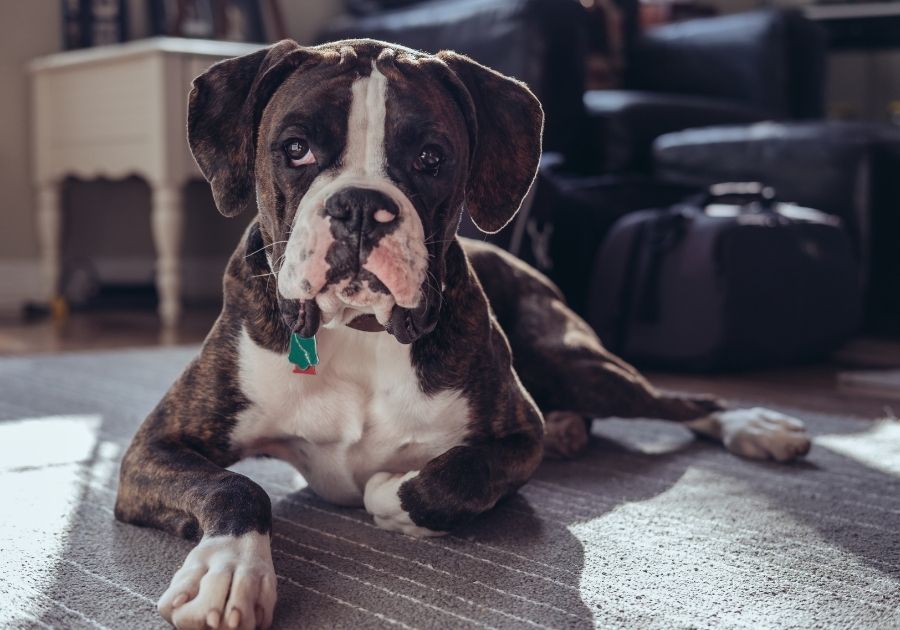
Boxers are easy to groom, and their short coats require a little brushing for them to look fine.
They shed moderately, but if you do your brushing right, you won’t have any problems coping with them.
These dogs are also known to self-clean like cats, so bathing should be kept at a minimum.
Though this breed is not highly vulnerable to ear infections, the ears should still be cleaned regularly with a good ear cleaner and cotton wool.
If you do notice signs of ear infection, contact a veterinarian.
Trim its nails too to avoid injuries. This breed loves to play and may scrape long nails on hard surfaces. They also risk scratching their owners in excitement.
Other parts of the dog’s body that needs cleaning include the teeth and the surface around the eyes.
Common Boxers Health Problems
Boxer dogs have a fairly long lifespan and a well-bred one shouldn’t have too many health issues.
This is why you should shop from a reputable breeder who can prove that there’s no inherited disease lurking in the pup’s genes.
When adopting, also be sure you’re getting a healthy dog. If you decide to adopt one with a significant health issue, make arrangements to accommodate the extra expenses and life changes.
Taking care of your dog’s needs can also lessen the chances of it always ending up in a vet’s office.
That said, here are some illnesses to look out for with the Boxer:
Cancer
Boxers are prone to developing brain tumors and other forms of tumor that lead to cancer.
The white-colored ones are also vulnerable to skin cancer when exposed to the sunlight for too long.
Some symptoms are loss of appetite, wounds that show no signs of healing, breathing difficulties, and urinary problems.
Boxer Cardiomyopathy
Also known as Arrhythmogenic right ventricular cardiomyopathy (ARVC), this disease hardly affects any other breed besides the Boxer—hence the name Boxer Cardiomyopathy.
It is genetic and is caused by a genetic mutation. ARVC leads to irregular heart rhythm and can make the dog collapse or even die.
Aortic stenosis
Aortic stenosis is another heart issue, also common amongst this breed. It is inherited and serious, so dogs with this disease are strongly advised not to be bred.
Aortic stenosis is caused by a narrowing of the aorta. It makes the affected dog excessively fatigued and leads to fainting. In severe cases, it can be fatal.
Hypothyroidism
Hypothyroidism is caused by a lack of thyroid hormone in the dog’s body. It is often managed but may last throughout the dog’s lifetime.
Hypothyroidism shows symptoms like obesity, lack of energy, and general dullness not characteristic of the Boxer.
Hip Dysplasia
Hip dysplasia is another inherited condition, though this is common to many breeds, not just the Boxer.
Hip dysplasia occurs when the thighbone doesn’t fit in the hip joint. Over time, it can lead to arthritis.
Some dogs show symptoms of pain and partial lameness, others show no symptoms at all.
Corneal Dystrophy
Corneal Dystrophy is an eye disease and genetic, but one that typically causes no pain or discomfort.
It is caused by metabolic issues that could lead to the forming of clouds in the affected eye, similar to cataracts.
Bigger dogs usually don’t get blind by this, but smaller dogs are more at risk.
Gastric Dilatation Volvulus (GDV)
Gastric Dilatation Volvulus is also known as ‘Bloat’ and tends to affect larger dogs.
GDV is caused by the filling of the stomach with food and fluids, which then makes the stomach twist. It is a critical condition and should be treated as an emergency.
Demodectic Mange
Demodectic Mange is also called Demodicosis and is caused by a mite named the Demodex Mite.
This mite is passed from a mother to a pup and can’t move to a human, neither can it be transferred from a dog to another.
The mite is usually harmless, but in a Boxer, with a weak immune system, it can lead to demodectic mange. Dogs that suffer from this are usually spayed or neutered.
Deafness
Deafness is more common amongst white Boxers, a major reason the color is considered undesirable.
It is tied to the same gene that causes the white color, and it is not always advisable to breed a white Boxer. Deafness can’t be cured, it can only be lived with.
Allergies
Boxers are prone to many allergies, including food and the environment around them.
Figure out your dog’s allergies and try to keep them away. If you notice any allergic reaction, take your dog for treatment.
Boxer Diet and Exercise Needs
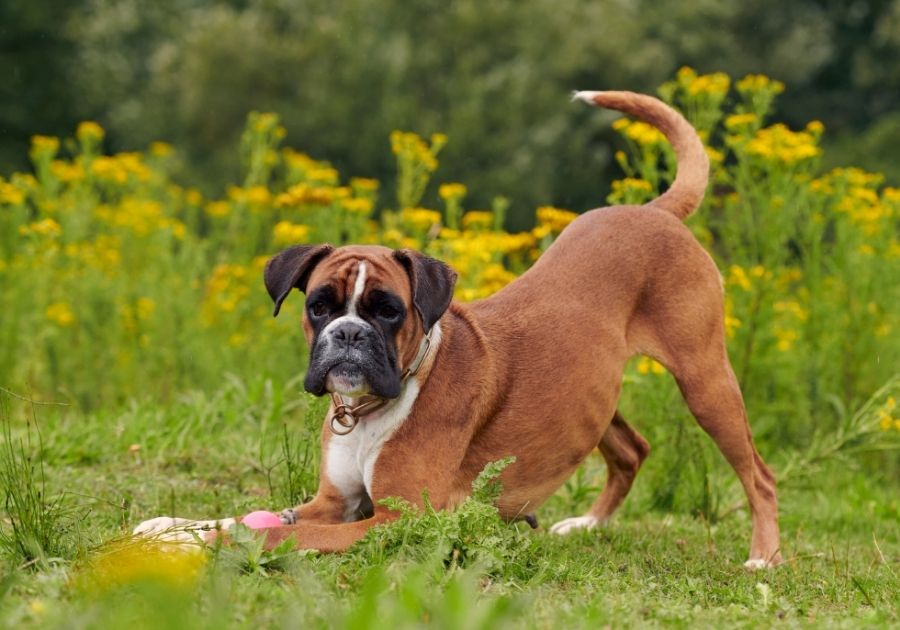
The other important needs not yet explained are exercise and nutrition.
Having already established that the Boxer is highly energetic, these two needs will help conserve the energy and put it to good use.
The Boxer needs daily exercise, at least an hour each day. You can choose to separate it into 30 minutes and have two exercise sessions.
One thing is for sure, you must be active before owning this breed or it will overwhelm you.
Physical activities can consist of fetch, walks, jogs, and even dog sports. Mental activities are important too.
As for feeding, this breed needs enough protein in high-quality dog kibble.
The diet should be drafted keeping the dog’s size and age in mind. Beware of overfeeding this breed as it is prone to obesity.
Is the Boxer Right For You?
While the Boxer is a good family dog, it isn’t for everyone. Having the breed as a favorite is good, but you should also weigh the pros and cons before making any decision.
To help you with that, here are the Boxer’s pros and cons.
Pros
- This breed is easy to groom
- They’re Playful and funny
- The breed is loyal and devoted
- Their imposing frame can chase off intruders
- The Boxer is a good guard dog
Cons
- They can be highly energetic
- This breed has a strong will
- It snores, drools, slobbers, and farts
- They are besieged by many health problems
You May Also Ask
How much does a Boxer cost?
The Boxer puppy is popular, making it a bit costly to shop for. You might find one in a price range of $800 to $2,800.
Are Boxer dogs family-friendly?
Boxers are very good for families and are the first choices for many households. Good with both adults and kids, it is playful and affectionate too.
Are Boxers aggressive?
Regardless of its name and strong physique, the Boxer is not known to be aggressive unless it is provoked or it sees its family in danger.
Is a Boxer good for first-time owners?
The Boxer can be good for a first-time pet parent, provided the person is active and knows how to be confident around dogs.
Do Boxers bark a lot?
Boxers are not high barkers, so if yours bark, it could be alerting you to something. Boxers are not quiet dogs, though. They vocalize with growls.
Do Boxers drool?
Drooling is a common Boxer habit alongside snoring. You should be sure you’re comfortable with these habits before getting a Boxer because it may not outgrow them.
Are Boxers cuddly?
Despite their intimidating looks and reputation as hunters, Boxers are very affectionate and love to cuddle.
Can a Boxer fight?
While Boxers are not ferocious, they can and sometimes do get into fights. This occurs more when they face intruders or are challenged by another dog.
Are Boxers smelly dogs?
Boxers don’t get dirty easily as they know how to clean themselves up, but there is the problem of flatulence that can make them stink.
Recommended:
Dogs That Don’t Smell: 30 Least Smelly Dog Breeds
Final Thoughts
If you want to add this dog breed to your family, then you’re in luck!
The Boxer makes a good family dog, and your grown-up kids will appreciate having this pooch around.
The good qualities don’t happen magically, however. This breed needs to be trained and taken care of in many ways, to ensure it has a long and happy life.
References & Notes
- Erika Mansourian, “Here’s Why Nothing Beats A Boxer As An Ideal Family Dog,” American Kennel Club, Nov 13, 2015, accessed Mar 20, 2022, https://www.akc.org/expert-advice/lifestyle/boxer-ideal-family-dog/.

